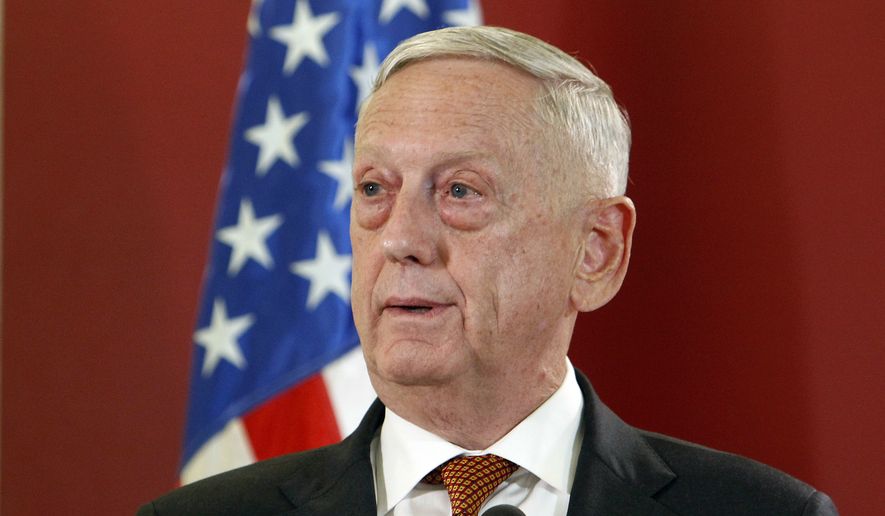Four years of President Trump’s “America first” approach to foreign policy has damaged the country’s standing in the world and eroded key partnerships that enhance U.S. national security, former Defense Secretary James Mattis said in a blistering op-ed Monday.
In a piece for Foreign Affairs, Mr. Mattis — along with other former military officials and leading foreign policy analysts — argued that the president’s view of America’s 21st-century role in the world is fundamentally misinformed and dangerous. They took specific aim at Mr. Trump’s effort to pull all U.S. troops from countries such as Afghanistan and Iraq, where they argue that American engagement is key to ensuring stability.
More broadly, Mr. Mattis and his colleagues said the U.S. must ensure its alliances with partners in Europe and Asia remain strong, particularly as foes such as China grow in military and economic might. Mr. Trump’s approach, they said, has hurt those alliances.
“The United States today is undermining the foundations of an international order manifestly advantageous to U.S. interests, reflecting a basic ignorance of the extent to which both robust alliances and international institutions provide vital strategic depth. In practice, ‘America first’ has meant ‘America alone,’” reads a portion of the op-ed. “That has damaged the country’s ability to address problems before they reach U.S. territory and has thus compounded the danger emergent threats pose.”
In addition to Mr. Mattis, the authors of the op-ed are: Kori Schake, director of foreign and defense policy studies at the American Enterprise Institute; Retired Adm. James Ellis, former commander of U.S. Strategic Command; and Joe Felter, a fellow at the Hoover Institution.
Mr. Mattis, also a fellow at the Hoover Institution, was Mr. Trump’s first defense secretary. He resigned in protest in late 2018 over the president’s decision to pull most U.S. forces from Syria.
Throughout his four years in office, Mr. Trump’s “America first” mantra has influenced many aspects of foreign policy. The president has publicly pressured NATO allies to ramp up defense spending, leading to rifts between Washington and some powerful European countries such as Germany. The White House also has pushed key Asian allies such as South Korea to pay more for U.S. military presence along its border with North Korea.
Mr. Trump also has pulled out of several major international deals, including the Paris climate accord, the Iran nuclear agreement, and others.
But nowhere has that philosophy been clearer than in the Middle East, where the president has vowed to bring U.S. troops home from nearly two decades of war in Iraq and Afghanistan. Mr. Trump fired former Defense Secretary Mark Esper — who reportedly opposed those withdrawals — and installed Acting Defense Secretary Christopher Miller in order to accomplish those goals before he leaves office in January.
The Pentagon has said the U.S. will cut its troop presence in both countries to 2,500 each by Jan. 15, five days before the president is expected to leave office.
Mr. Mattis said Mr. Trump’s attitude toward those conflicts is misguided, though he also said presumptive President-elect Joseph R. Biden is guilty of the same characterizations.
“To dismiss U.S. involvement today in Afghanistan, Iraq, and elsewhere as ‘endless’ or ‘forever’ wars— as both President Donald Trump and President-elect Joe Biden do — rather than as support to friendly governments struggling to exert control over their own territory misses the point,” reads a portion of the op-ed. “It is in the United States’ interests to build the capacity of such governments to deal with the threats that concern Americans; that work isn’t quick or linear, but it is an investment in both greater security and stronger relationships and preferable to the United States’ indefinitely having to take care of threats on its own.”
Mr. Mattis and his colleagues said America’s military might is just one aspect of its power abroad. Its relationships with allies, they said, is equally vital.
“The best strategy for ensuring safety and prosperity is to buttress American military strength with enhanced civilian tools and a restored network of solid alliances — both necessary to achieving defense in depth,” they wrote. “The pandemic should serve as a reminder of what grief ensues when we wait for problems to come to us.”
Mr. Trump fired back on Twitter Tuesday morning.
“That says it all about Mattis. Obama fired him. I should have fired him sooner,” the president said. “Did best work after he was gone. World’s most overrated general!”
Mr. Mattis was not fired by the president. He resigned amid sharp disagreements about America’s military presence in Syria.
• Ben Wolfgang can be reached at bwolfgang@washingtontimes.com.




Please read our comment policy before commenting.